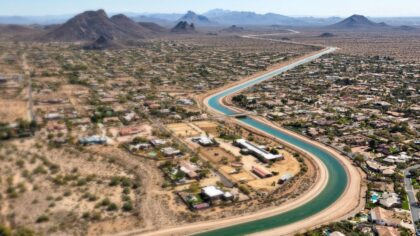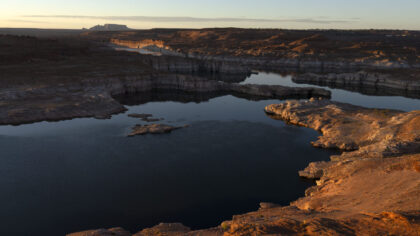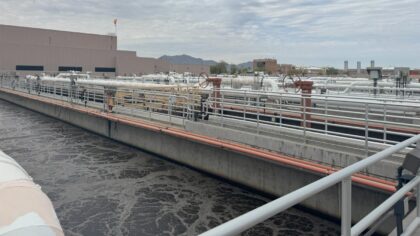PHOENIX — Veolia’s Hubgrade Center in Scottsdale helps over 300 municipalities in North America manage water.
It’s where advanced monitoring systems and data analytics developed by Veolia come together with human expertise to improve municipal water operations and wastewater plants.
The global company, whose North American branch is headquartered in Scottsdale, monitors the treatment of more than one billion gallons of water every day.
How Hubgrade Center in Scottsdale impacts US water systems
Veolia oversees 40 million gallons of treated wastewater a day in the southwest alone, according to Aaditya Raman, the company’s president of municipal water operations.
“We monitor everything at a wastewater plant, whether that be chemical usage, biosolids, energy usage at the facilities,” Raman told KTAR News 92.3 FM.
As the world’s largest environmental services and water company, Veolia supports communities worldwide in managing water, waste and energy operations. The company helps the plants optimize operations to conserve water and money, while passing the savings on to customers.
For example, Raman said the company has doubled the lifespan of water treatment membranes at the facilities that they run due to the advanced levels of monitoring, saving municipalities millions of dollars.
Membranes are man-made barriers used to purify water by selectively separating contaminants.
What kind of technology does Veolia use to manage water?
Veolia uses a robotic dog at water plants to assist operators by detecting issues like small chemical leaks.
“A digital twin is really a replication of a physical plant in a three-dimensional digital space,” Raman explained. “You can put on VR goggles and be instantly transported to a wastewater or water plant.”
The digital twin allows new recruits to be trained without having to be onsite and helps staff monitor operations or any issues that may arise. Veolia is also helping to create a pipeline of workers for careers in the water industry.
Raman said Veolia also uses VR digital twins to introduce high school and college students to water treatment plants, helping make careers in the industry more appealing.
Robotic dogs help keep its water plants safe
Veolia has a robotic dog that can be deployed to water plants to work alongside operators.
“Sometimes small chemical lines at these facilities break or have a crack. The [robo] dog can detect those small leaks before a human can,” Raman explained.
He said efficiently managing water is important, especially in the Southwest, because the desert is water stressed but is attracting a lot of industry. And water security is an essential part of ensuring municipal growth.
“To sustainably grow a state or a local community you need to be able to effectively manage your water and energy resources. And that’s the tools and the technology that we’re making available to our communities,” Raman said.
He hopes to help smaller communities gain access to Veolia’s technological advancements.
Veolia currently runs the operations for ten wastewater treatment plants and will be up to 28 by the end of the year. They’re also in talks with five plants in Arizona to hopefully bring them onboard.
The post Scottsdale’s Veolia Hubgrade Center manages wastewater treatment plants across US appeared first on KTAR.







